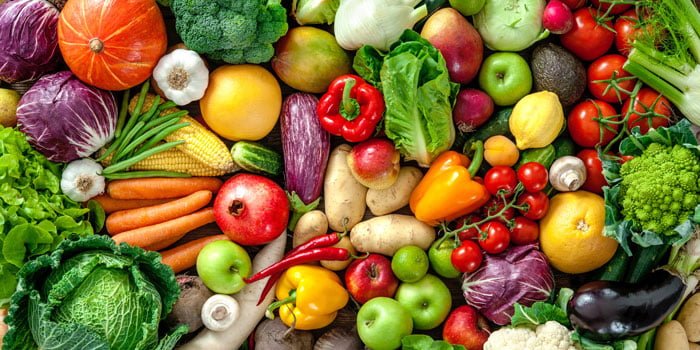
These days, we spend lots of time and money considering what we put on our faces. We’ve also had the privilege (and sometimes disadvantage) of having lots of people’s ideas and opinions on what to do to achieve clear skin. This has led to some stumbling onto great natural home remedies and also a lot of other people destroying their skin with products that don’t suite them.
But ask yourself, how much do you think about whether or not you’re following a clear skin diet? I mean what you put on the outside counts, but what you put inside matters so much more.
Your diet is clearly linked to skin condition. But there’s so much conflicting information about how to manage your diet for the most beautiful skin possible. So how do you use food to get that bomb skin you’ve always wanted?

Don’t overdo it!
We’ve seen a couple of crazy DIY recipes (including one that I saw about a mayonnaise face mask) and it’s crucial to know what works for you and what doesn’t.
Also, face masks aren’t supposed to be in your daily skincare routine. Some of the DIY recipes we find on the internet (that include foods you find in the house) and they end up slowly stripping the skin off precious oils.
How do you know what’s best for you? –
1. Know your skin type: I cannot stress how important this is. It’s better to be safe than sorry!
2. Start out by choosing what you know what won’t react to your face. E.g Coconut oil is a generally amazing product, but it can also clog your pores; Lemons are also great, but they have a pH of 2 meaning they can burn your skin; Sugar is yummy, but its particles can cause microtears on your face. See where I’m going with this?
3. Don’t just jump into a skincare routine wagon because your friends are. Again, we all have different skin types so first figure out what works for you.
Eat more fruits and veggies
Fruit and vegetables contain powerful antioxidants that help to protect skin from cellular damage.
Eat a rainbow of colourful fruit and vegetables and aim for at least five portions a day. The potent antioxidants found in most of these veggies are important for normal skin cell development and healthy skin tone.
Eat Less Inflammatory Foods
The biggest culprit are dairy, gluten and sugar. If you’re having issues with your skin, those are foods to experiment with eliminating.
Try taking them out of your diet for two weeks and see if that has any effect.
Stay hydrated
Even without being reminded, you need to keep your fluid levels up – especially in this unbearable Nairobi heat. 😥
Your skin needs moisture to stay flexible. Drink six to eight glasses of water a day – all fluids count towards your daily allowance, but water is the best.
Carry around a large bottle of water wherever you go. Also include herbal and caffeine-free teas. Lots of watermelon, courgette and cucumber, also contribute fluids to the skin – the added benefit is that the minerals they contain will increase the rate you hydrate your body and skin.
Include lots of minerals
Zinc – Zinc is involved in the normal functioning of the sebaceous glands in the skin (which produce oil) and helps to repair skin damage and keep skin soft and supple. Zinc-rich foods include fish, lean red meat, wholegrains, poultry, nuts, seeds and shellfish.
Sulfur – Sulfur is the third most abundant mineral in the human body, present in every cell, with its greatest concentration in hair, skin and nails.
Sulfur also works great at fighting bacteria, clarifying the skin, minimizing pores, as well as preventing and healing damage caused by blemishes. Some great sources of sulfur include eggs, garlic, onions & kale.
Magnesium is an essential mineral for skin, bones, teeth, hair and the muscles, and it helps keep the nervous system running smoothly. A magnesium deficiency can accelerate aging of the skin.
Some sources include nuts, coconut, barley, kidney beans, spinach, dates and brown rice.
Stock Up on healthy fat
Monounsaturated and polyunsaturated fats – the types found in avocados, oily fish, nuts and seeds – provide essential fatty acids which act as a natural moisturiser for your skin, keeping it supple and improving elasticity.
Take advantage of Honey!
Using Honey for skin is always an amazing idea! Mixed with natural ingredients – and the fact that it’s easily found in your kitchen and doesn’t expire! – makes for effective and inexpensive beauty treatment.
Honey has numerous benefits which I’ll highlight in another article but know that applying honey regularly on your skin can give you results beyond your imagination and can go a long way in giving you healthy, younger looking and glowing skin!















